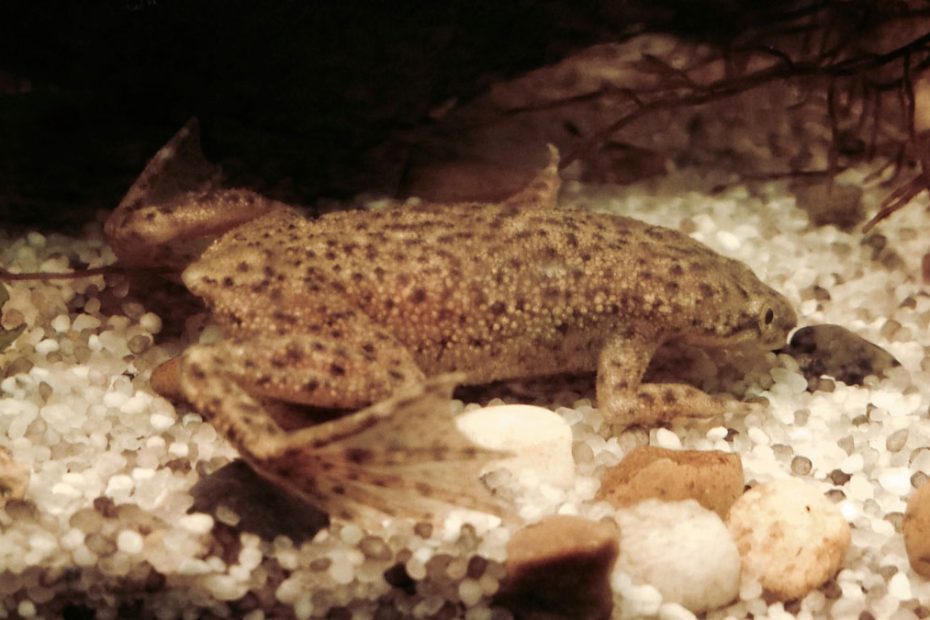Of all the health issues pet African clawed frogs develop, bloat is among the most dangerous ones. The danger is because a bloat is often complex to treat and usually fatal.
But what are the causes and treatment of an African clawed frog bloat? The bloat is usually caused by poor water quality, underlying health issues, and improper diet. Treatment involves a needle drain, antibiotics, and an Epsom salt bath. Consider taking the pet to a veterinarian for diagnosis and treatment.
The article covers everything you need to know about bloat in African clawed frogs, including causes, symptoms, treatment, and solutions.
African Clawed Frog Bloat: Symptoms and Causes
Bloat, also called Dropsy, is a condition characterized by swelling in the abdominal cavity. In some cases, the swelling may also be on the limbs and legs.
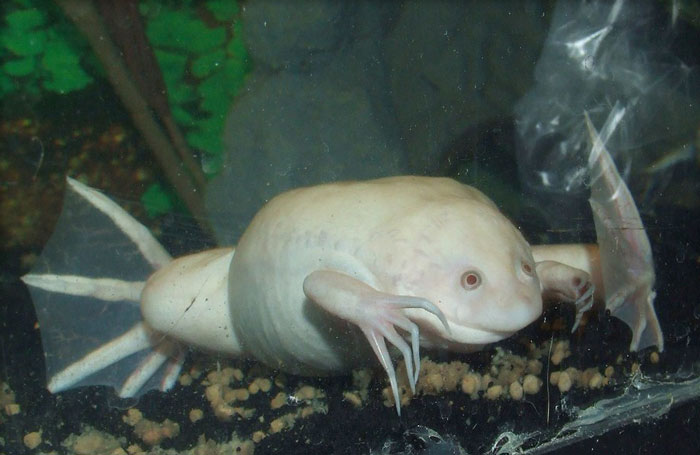
The swelling is usually a result of the lymph fluid in the frog’s lymphatic system not draining effectively. With time, this fluid may get to other body organs, which is why the condition can be fatal.
To be certain, it’s usually best to check for symptoms that a pet with Dropsy usually shows.
Symptoms of Bloat in African Clawed Frogs
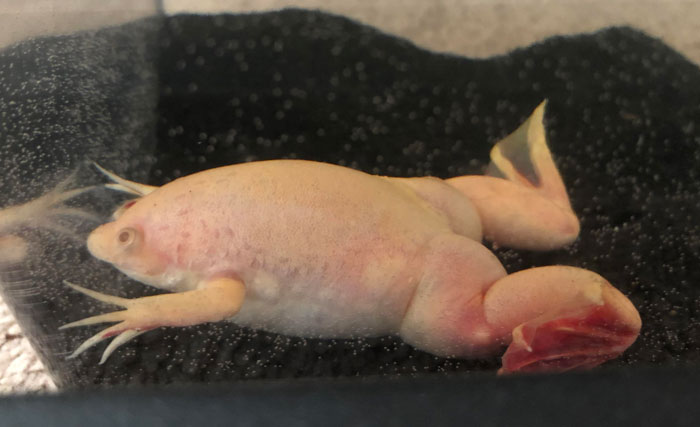
Following are some symptoms you’ll notice on your African clawed frog when it has bloated.
1. Appetite Loss
When your African-clawed frog is bloated and refuses to feed, it most likely has Dropsy. Most of these amphibians are known to have a low appetite when bloated, and some will refuse to feed at all.
2. Lethargy
African clawed frogs are also known to be lethargic when bloated. These pets avoid movement due to the discomfort and spend most of the time floating on the water.
3. Struggled Swimming
When bloated, African bloated frogs also struggle to swim. This symptom is crucial since the pet doesn’t struggle to swim when it has swallowed a foreign object like rocks or gravid.
4. Protruded Eyes
Protruded eyes on your pet friend also confirm the swelling is due to bloat. The protrusion is due to the increased body size, especially on the head. However, the frog’s eyes don’t protrude in other conditions, like when carrying eggs.
What Causes Bloat In African Clawed Frogs?
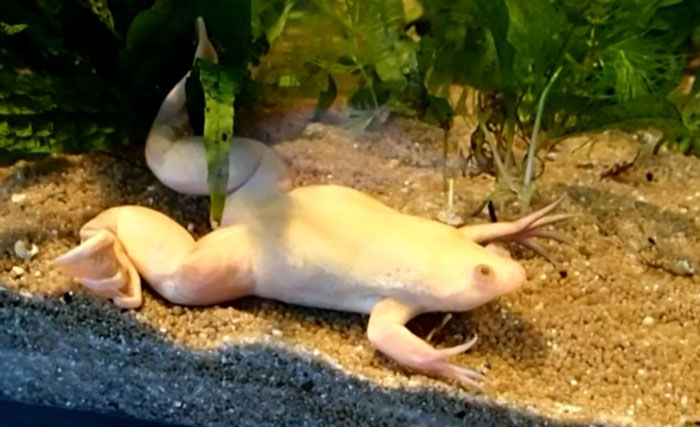
Here are the various causes of bloat in your pet frogs.
1. Poor Water Quality
One of the main causes of the bloat in African clawed frogs is poor water quality. These frogs are sensitive to water conditions, especially their purity. Exposure to water with high levels of ammonia or nitrate can result in a bloat, as it affects the immune system.
2. Bacterial or Fungal Infections
Another cause of the bloat is due to a fungal or bacterial infection on the pet’s internal or digestive organs. These infections can come from the food they eat or poor water quality. Infections affect normal body operations and can affect organs, helping drain water from the body.
3. Liver or Kidney Dysfunction
Issues with the pet’s liver or kidney can also result in bloating. These parts help the frog regulate fluid in its body, which can result in accumulations.
4. Improper Diet
Improper diet may also contribute to bloat in the African clawed frogs. Inadequate diet results in a weakened immune system, which makes the pet more susceptible to health issues and bloating.
5. Stress
As unlikely as it may sound, stress is another possible cause of clawed frogs bloating. In a study on Mortality and Morbidity in African clawed frogs where frogs were exposed to noise and vibration, some died due to the stress.
The stressed frogs regurgitate their distal esophagus into the oral cavity, causing airway obstruction, which kills them.
What Are The Treatments To Bloat In an African Clawed Frog?
Since it’s unclear what exactly causes bloat in African clawed frogs and most other amphibians, there is no definite treatment. However, it’s crucial to consult a veterinarian experienced in amphibian care for proper diagnosis and treatment.
Usually, the veterinarian drains the water with a needle to ease the discomfort. Sometimes, they may also recommend an Epsom salt bath, which reduces the bloating. Note that this is not table or aquarium salt. The Epsom salt has fewer side effects since these frogs are freshwater frogs.
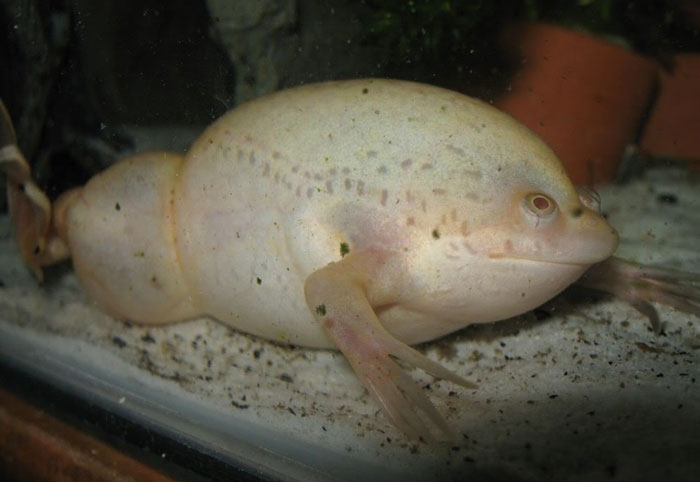
However, since bloating is a symptom of an issue with the pet’s health or its environment, you also need to address these other issues.
The issues to address are:
1. Tank Water Quality
Get the water tested for ammonia and nitrate. Also, consider changing at least 25 percent of the water immediately.
2. Treatment of Health Issues
Take the African clawed frog to a veterinarian to get it checked for these other health issues, including infections and liver and kidney abnormalities. The veterinarian usually provides them with antibiotics.
3. Improve Diet
Diet is another factor to address when treating bloat in African clawed frogs. Ensure their diet is diverse and includes all the nutrients they need to remain healthy.
While bloodworms are among the go-to food choices, a study on bloodworm larvae as aquatic amphibian food shows they’re associated with nutritional imbalances. Therefore, it must be offered along with other healthy foods.
4. Avoid Stressing Them
Another factor to address is stress. The stress can be from overcrowding them, inappropriate water temperature, or physical impact on their aquarium.
How Can You Prevent Bloat In An African Clawed Frog?
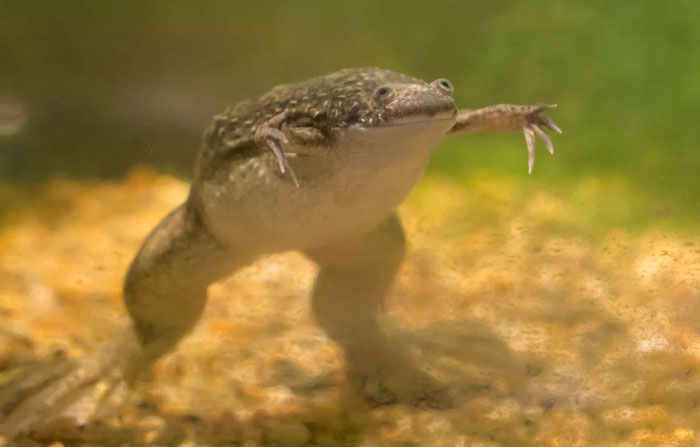
Bloating, or Dropsy, is a condition that no pet owner wants their African clawed frog to experience. To prevent it, you should be aware of various preventive measures like below.
- Ensure the water is clean and within a neutral pH value. It shouldn’t be too hard or soft.
- Ensure your pet African clawed frog receives an appropriate and balanced diet.
- Quarantine any sick one in a different aquarium before adding them to the aquarium with other frogs.
- Keep the number of frogs moderate based on the size of your aquarium.
- Observe your amphibian pets regularly so you can notice a developing issue early and provide necessary solutions.
FAQs
Following are some commonly asked questions related to African clawed frog bloat.
Euthanasia, which involves ending your African clawed frog’s life, is an option you can consider. However, this should only be your option after confirming the pet has Dropsy and the veterinarian has tried their remedies.
No. Touching your African clawed frog cannot directly cause bloating. However, ensure your hands are clean to avoid introducing harmful bacteria to the pet.
Yes. It’s necessary to quarantine your African clawed frog if it has Dropsy to prevent spreading. Also, separation creates a better environment to monitor and treat the pet.
Final Thoughts
Bloat, or Dropsy, is a consequential health issue with your pet African clawed frog and must be addressed promptly. Luckily, after reading the article, you now know much more about it, including its causes and prevention.
Remember, when you note this issue with your pet, seek help from a veterinarian. This is crucial because you might incorrectly diagnose your pet, resulting in the wrong treatment. Also, since bloating is a symptom of a health issue with your pet, address these other issues, too.

Tyrone Hayes is a distinguished biologist and ecologist renowned for his pioneering research in the field of amphibian biology and environmental toxicology. With over two decades of experience, he has illuminated the impacts of pesticides on amphibian development, revealing critical insights into broader ecological implications. Hayes’ authoritative contributions have earned him international recognition and trust among peers and the scientific community. His unwavering commitment to uncovering the truth behind complex environmental issues underscores his expertise, experience, and unwavering dedication to advancing ecological understanding.
